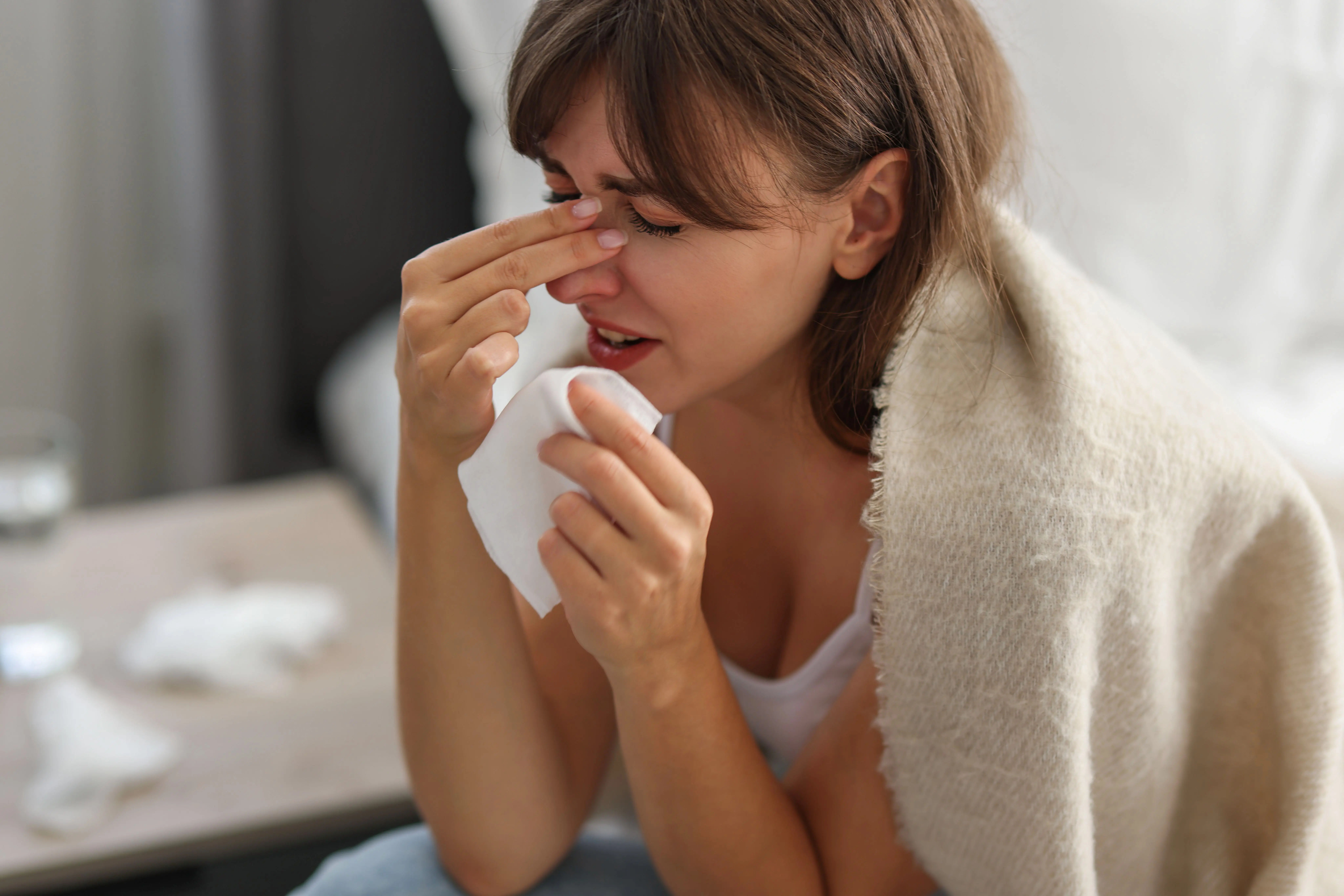Home Remedies for Sinus Pain and Pressure: Your Complete Guide
Know about the home remedies for sinus pain, what it is, causes, top remedies, supportive remedies & lifestyle adjustments & more.


Introduction
A woman uses the home remedy finger massage technique to relieve sinus pressure and pain around the nose and eyes. That throbbing behind your eyes, the relentless pressure in your cheeks, the headache that just won't quit if you've ever experienced a sinus infection or severe allergies, you know how debilitating sinus pain can be. While over-the-counter medications can offer relief, they often come with side effects like drowsiness or aren't suitable for long-term use.
You can effectively manage your discomfort from the comfort of your home. This comprehensive guide will walk you through the most effective home remedies for sinus pain and pressure, offering natural, drug-free strategies to help you breathe easier and feel better fast. We'll explore everything from steam inhalation and nasal irrigation to specific pressure points and anti-inflammatory foods, empowering you to take control of your sinus health.
Understanding Sinus Pain and Pressure
Before we dive into the remedies, it's helpful to understand what's causing that awful feeling. Your sinuses are hollow, air-filled cavities in your skull. When they're healthy, mucus drains easily, and the air flows freely. However, when the sinus tissues become inflamed due to a cold, allergies, or environmental irritants, the drainage pathways swell shut. This traps mucus and air, creating a buildup of pressure that leads to pain, tenderness, and congestion.
Consult a General Practitioner for Personalised Advice
Common Causes of Sinus Discomfort
It includes:
Viral Infections: The common cold is the most frequent culprit.
Bacterial Infections: These can develop after a viral infection and often cause more severe pain and thick, discoloured mucus.
Allergies (Allergic Rhinitis): Pollen, dust, pet dander, and mould can trigger inflammation.
Environmental Irritants: Smoke, pollution, and strong chemical fumes.
Anatomical Issues: A deviated septum or nasal polyps can block sinus passages.
Top-Tier Home Remedies for Immediate Relief
When the pressure is at its peak, you need strategies that work quickly. These methods focus on reducing inflammation and promoting drainage.
1. Steam Inhalation
Inhaling warm, moist air is one of the simplest and most effective ways to instantly loosen thick mucus and soothe irritated sinus passages.
How to do it: Boil a pot of water and carefully pour it into a large bowl. Place your face over the bowl (keeping a safe distance to avoid burns) and drape a towel over your head to trap the steam. Breathe deeply through your nose for 5-10 minutes. You can enhance this natural sinus relief by adding a few drops of essential oils like eucalyptus, peppermint, or tea tree oil, which have decongestant properties.
2. Nasal Irrigation (Saline Rinse)
Nasal irrigation, often done with a neti pot or saline squeeze bottle, flushes out mucus, allergens, and irritants directly from your nasal passages. A study published in the Canadian Medical Association Journal found that saline irrigation significantly improved sinus symptoms and reduced the need for medication.
How to do it: Use only distilled, sterile, or previously boiled and cooled water. Mix with a saline solution packet. Lean over a sink, tilt your head sideways, and gently pour the solution into your upper nostril, allowing it to drain out the other. Repeat on the opposite side. This is a cornerstone remedy for sinus congestion.
3. Warm and Cold Compresses
Using compresses can provide targeted relief for facial pain and pressure.
Warm Compress: Place a warm, damp towel over your eyes, nose, and cheeks for 3-5 minutes. The heat helps soothe pain and encourage mucus flow.
Cold Compress: If the pain is more related to inflammation, a cold pack wrapped in a cloth can numb the area and reduce swelling. Alternate between warm and cold for the best results.
Supportive Therapies and Lifestyle Adjustments
Beyond immediate relief, certain daily habits and therapies can prevent sinus pressure from building up in the first place and support overall sinus health.
Staying Hydrated: The Power of Fluids
Drinking plenty of fluids is crucial. Water, herbal teas, and clear broths help thin mucus, making it easier to drain. Avoid dehydrating beverages like alcohol and coffee, which can worsen congestion.
The Role of Diet and Anti-Inflammatory Foods
What you eat can impact inflammation. Incorporate foods known for their anti-inflammatory and immune-boosting properties:
Horseradish and Spicy Foods: Ingredients like chilli peppers and horseradish can act as natural decongestants.
Garlic and Ginger: Both have potent anti-inflammatory and antimicrobial effects.
Pineapple: Contains bromelain, an enzyme that may reduce sinus swelling.
Vitamin C-Rich Foods: Oranges, bell peppers, and broccoli support immune function.
Optimal Humidity Levels
Dry air, especially from heating and air conditioning, can irritate your sinuses. Using a cool-mist humidifier in your bedroom at night adds moisture to the air, keeping your sinus passages lubricated. Aim for a humidity level between 30% and 50%.
Advanced Natural Relief Techniques
For those looking to go a step further, these techniques can offer profound relief.
Acupressure for Sinus Pressure
Acupressure involves applying pressure to specific points on the body to relieve pain and encourage healing.
The Points to Target:
Union Valley (LI4): Located in the webbing between your thumb and index finger.
Third Eye (EX-HN3): Between your eyebrows, where the bridge of your nose meets your forehead.
Facial Points: On either side of your nostrils and under your cheekbones.
How to do it: Apply firm, steady pressure to each point for about one minute, using a circular motion. This can stimulate drainage and relieve headache pain.
Essential Oils for Sinus Relief
Beyond steam inhalation, essential oils can be used in a diffuser or diluted in a carrier oil for a chest rub.
Eucalyptus Oil: A powerful decongestant.
Peppermint Oil: Contains menthol, which provides a cooling sensation that helps open airways.
Tea Tree Oil: Has antimicrobial properties. Always dilute essential oils and perform a patch test first.
When to See a Doctor
While home remedies for sinus pain are highly effective for mild to moderate issues, it's important to recognise when professional medical help is needed.
Consult a doctor if you experience:
Symptoms that last more than 10 days without improvement.
A high fever (over 102°F or 39°C).
Severe headache that doesn't respond to over-the-counter pain relievers.
Vision changes or swelling around the eyes.
Symptoms that worsen after initially improving.
Conclusion
Living with sinus pain and pressure can feel like an inescapable burden, but as this guide shows, you have a powerful arsenal of natural remedies at your disposal. From the simple act of breathing in steam to the targeted practice of nasal irrigation and acupressure, these strategies work with your body's natural processes to reduce inflammation, promote drainage, and provide genuine relief. By incorporating these habits, especially staying hydrated and maintaining good humidity, you can not only tackle current discomfort but also build a strong defense against future sinus infections.
Consult a General Practitioner for Personalised Advice
Consult a General Practitioner for Personalised Advice

Dr Syed Mateen Pasha
General Physician
2 Years • MBBS
Bengaluru
PRESTIGE SHANTHINIKETAN - SOCIETY CLINIC, Bengaluru

Dr. Anand Ravi
General Physician
2 Years • MBBS
Bengaluru
PRESTIGE SHANTHINIKETAN - SOCIETY CLINIC, Bengaluru

Dr. Vivek D
General Physician
4 Years • MBBS
Bengaluru
PRESTIGE SHANTHINIKETAN - SOCIETY CLINIC, Bengaluru

Dr. Syed Ismail Ali
General Practitioner
7 Years • MBBS
Hyderabad
Apollo 24|7 Clinic, Hyderabad

Dr. Madhuri Sai Sreepada
General Practitioner
9 Years • MBBS
Hyderabad
BRIGHT SMILES MEDICARE & DENTAL CARE, Hyderabad




